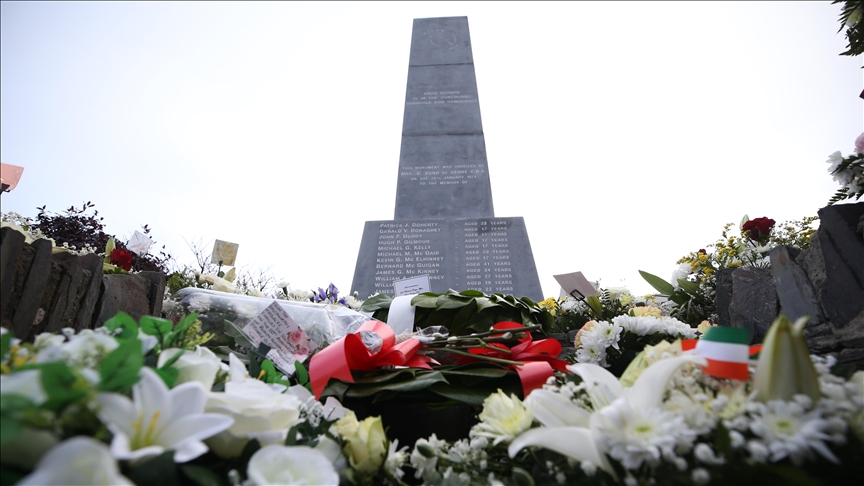Northern Ireland's Bloody Sunday victims remembered on 51st anniversary
Ireland's Social Democratic and Labour Party leader plans to nominate families of Bloody Sunday victims for Nobel Peace Prize later this year
 : A ceremony is held to commemorate the 13 civil rights marchers who were shot dead by a British elite parachute regiment on the streets of Londonderry (Derry) on Jan. 30, 1972, on the 50th anniversary of the incident, in Londonderry (Derry), Northern Ireland on January 30, 2022.
: A ceremony is held to commemorate the 13 civil rights marchers who were shot dead by a British elite parachute regiment on the streets of Londonderry (Derry) on Jan. 30, 1972, on the 50th anniversary of the incident, in Londonderry (Derry), Northern Ireland on January 30, 2022.
LONDON
The relatives of those killed on Bloody Sunday, one of the worst massacres in British history, have been remembering their loved ones on its 51st anniversary, with special events being held in Northern Ireland and the UK throughout the week.
The infamous killings of 14 civil rights marchers by Britain’s elite parachute regiment on Jan. 30, 1972 is known as Bloody Sunday.
The massacre took place in the northwestern city of Londonderry – known as Derry by its majority-Irish nationalist population.
Anger about Bloody Sunday spread across the world as it was recorded by television crews and generated a wave of new recruits for a resurgent Irish Republican Army (IRA).
The killings accelerated Northern Ireland’s descent into conflict between the British government and pro-British paramilitaries on one side and Irish Republicans and nationalists on the other.
On Monday, local media reported that Colum Eastwood, the leader of Ireland's Social Democratic and Labour Party (SDLP), plans to nominate the families of the Bloody Sunday victims for the Nobel Peace Prize later this year.
astwood said this would be a fitting tribute for the families' "long fight for truth and justice."
Inquiry
The UK government initially claimed the soldiers were responding to gunfire from nearby buildings – a finding that was supported by an early investigation called the Widgery Report.
But after years of pressure from victims’ families, the 12-year Bloody Sunday Inquiry, also known as the Saville Inquiry, found that the victims had not posed a threat to soldiers.
In June 2010, British Prime Minister David Cameron issued an official apology for the killings on behalf of the government, confirming that those killed were innocent victims.
He said the killings were "unjustified and unjustifiable."
The 1998 Belfast peace deal – dubbed the Good Friday agreement – largely saw the end of the Troubles-era violence, in which more than 3,500 people lost their lives.








